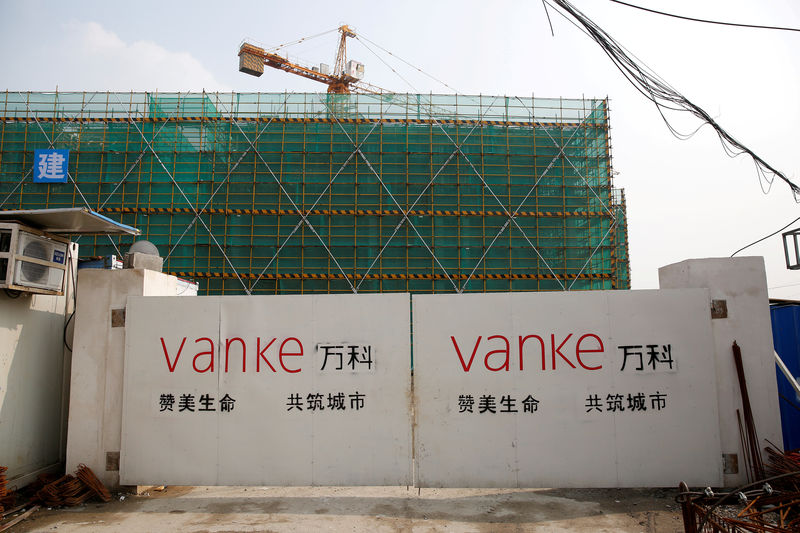By Clare Jim
HONG KONG (Reuters) - Chinese developers such as China Vanke (HK:2202) and Country Garden (HK:2007) are increasingly turning to the securitization market as an alternative fund-raising channel as the onshore bond market remains mostly inaccessible.
Property companies are in particular stepping up the securitization of receivables from property sales, providing them with funds to develop other projects.
The securities took off when Chinese regulators made it harder for developers to sell onshore corporate bonds late last year in a bid to help cool an overheating real estate market.
The issuing of such products more than tripled in the first seven months of this year from a year ago, according to data by China Securities Research.
The China Securities Regulatory Commission did not respond to requests for comment.
More than 11 Chinese developers have issued or announced plans this year to issue securities backed by sales receivables, including China Vanke (SZ:000002), Greentown China (HK:3900), and the state-owned Beijing Capital Land (HK:2868), up from around six last year.
Developers typically record revenue in their books 12-24 months after contracted sales, when they actually transfer the property ownership to the buyers and pocket the proceeds. The asset-backed securities allow them to cash in on those receivables early.
"Chinese policies often change. If you rely on a simple channel, once policy changes, it will affect our cashflow so we have to explore other channels," said an official of Greentown, which issued 1.6 billion yuan worth of the securities this month, referring to the crackdown on debt. The official requested anonymity because he was not authorized to speak to media.
Beijing Capital said that the securities provided a cheaper financing option for the company. Vanke said it considered the securities to be low cost and low risk.
Rates of the securities issued in the last two years were around 5 to 7 percent, slightly higher than onshore corporate bonds. The securities usually have short maturities of 2 to 4 years, and range in size from 1 to 5 billion yuan. The securities are listed in stock exchanges and traded among banks and institutional investors.
Joe Zhou, head of research at JLL East China, said securitization by developers reflected strong property sales and China's macroeconomic environment, as well as official pressure to reduce debt. "Many developers have the incentive to lower leverage," he said.
As China pushes to reduce excessive debt in the economy, the country's fledgling securitization markets have seen a surge of activity, with cash-starved banks, local governments and private companies converting assets into cash.
Most developers consolidate asset-backed securities on their balance sheets as debt, because the mortgage receivables are used as collateral. However, the securities are still seen by ratings agencies as meaningful deleveraging.
"From a rating agency's perspective, we do not only look at whether the balance sheet is shrunk, but whether the payment obligation also decreases," said Aaron Lei, senior director of structured finance ratings at S&P.
"ABS payment obligations will not recourse back to the initial originator, which means the interest payment comes from the spinned-off assets, and not from the issuer," he said, referring to asset-backed securities.
Analysts say that, for the moment, the risks involved with the securities are low, given their relatively high quality and low total issuance.
Of China's trillion yuan ($147.1 billion) overall asset-backed securities market, property companies issued around 40 billion yuan of products in 2016. More than 70 percent of the issuance was backed by receivables from property sales, according to China Securities Research.
The confidence also lies in government regulations to keep downpayment requirements at about 30 percent, and even higher for first-home purchases.
"Traditionally, China's mortgage risk is low," said S&P's Lei, because borrowers were personal liable for their debts.
That "makes home buyers less inclined for a mortgage to default because they still bear the liability after they default," he said.
However, in the case of a downturn in the property market, mortgage default risks could increase, analysts said. And as the asset-backed securities market grows quickly, some lower-quality issuers could join the market.

"Now that regulation is strict, defaults won't happen," said JLL's Zhou, citing the high quality of assets and products in general. "But in the future, if some assets are problematic and issuers still package them for financing, then defaults could happen."